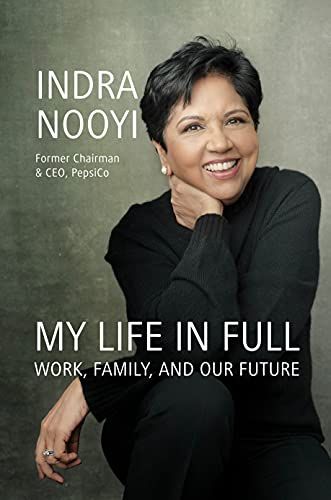Former CEO and chairman of PepsiCo Indra K. Nooyi offers a career and life retrospective that seeks to inspire women to succeed in the corporate world.

An Inspiring Role Model
Indra K. Nooyi served as CEO and chairman of PepsiCo from 2006 to 2018, when she lived and breathed the brand. Here, she provides a nuanced perspective, addressing both her ambitions and the work-life balance frustration they generated.
At PepsiCo, Nooyi writes proudly, she expanded the brand without compromising her vision. Her insights into how the corporate world treats women and people of color have a familiar message: Balancing work and family is difficult, men have it easier than women and governments should support caregivers. However, Nooyi has a particularly well-informed perspective because she’s been at the peak of corporate power.
Education for Women
Indra Krishnamurthy Nooyi comes from a Brahmin family that valued included being devout, living simply and cherishing education. Raised in India, she specialized in sciences in high school, and then studied at the Indian Institute of Management (IIM) in Calcutta (now Kolkata). The college had links to the Massachusetts Institute of Technology (MIT) and offered a traditional MBA degree program. Nooyi studied finance, marketing, strategy and operations with strong quant elements, particularly supply chain management and logistics.
We thrive, individually and collectively, when we have deep connections with our parents and children, and within larger groups, whether we are related or not. I believe that healthy families are the root of healthy societies.Indra Nooyi
She landed her first job, with the textile company, Mettur Beardsell, after she impressed the head of recruiting by holding her own in a group of men. That would become, she stresses, a hallmark of her career. Nooyi and other women of her generation supported the burgeoning women’s movement and India’s policy of educating more women.
Johnson & Johnson
At Mettur Beardsell, Nooyi went door-to-door with sample fabrics and threads. Upon her promotion to assistant product manager, she visited factories to monitor production quality control. A stickler for details, Nooyi explains that she worked hard, earned well and learned fast.
Feminine hygiene was a taboo subject in India in 1978, when Nooyi became a product manager overseeing the Stayfree brand at Johnson & Johnson in Mumbai. While adhesive Stayfree maxi pads were commonplace in the United States, Indian women mostly used cloth for their periods, an option that limited their freedom.
Nooyi internalized the American work ethic, working long hours and weekends. She gained a scholarship to Yale’s School of Organization and Management and moved to New Haven, Connecticut. Nooyi loved Yale, but felt she didn’t fit in. She bought cheap clothes, worked low-paying jobs and sent money home to her family.
Subsequently, Nooyi earned an internship with the consulting firm Booz Allen Hamilton in Chicago.
She wore a sari to a successful job interview and, eventually, wore saris to the office, but not among clients. In subsequent years, she stuck to conventional business attire, such as a suit and high heels, but added bright silk scarves, a style the media dubbed “business Indian.” Throughout her career, she found the media’s focus on corporate women’s attire and appearance insulting.
Balance
Nooyi always believed women should earn a living, that children do not suffer adverse effects from their mothers’ absences for work, and that working women provide a role model of independence and ambition.
Living in the United States meant Nooyi couldn’t follow the traditional Indian courtship rites or call on family involvement when she met her future husband, Raj Nooyi, an ambitious engineer. The couple had two daughters, Preetha in 1984 and Tara in 1992. They bought their first house with a small family loan and, as Nooyi writes with palpable emotion, thrived within their self-created, deeply appreciated “care ecosystem.”
Nooyi regrets missing milestones in her children’s lives, but her family moved when opportunities arose. She notes that in the 1980s and 1990s, she and her husband couldn’t easily stay in touch when one of them was on the road.
When she joined PepsiCo in 1994, Nooyi had to invest time in the company. She seldom ate properly, exercised, slept or, she relates sadly, properly parented her daughters. The Nooyis’ only trips were to India to see their families.
Healthier Choices
As a strategist at Motorola – from 1986 to 1990 – Nooyi learned about communication networks and computers. While working at ASEA Brown Boveri from 1990 to 1994, she learned about heavy electrical equipment and saw how to compete with General Electric.
I had no idea how to take a break from work and then return a few years later. I could think of no examples of women who had done this.Indra Nooyi
When she accepted a position as PepsiCo’s senior vice president of strategy in 1994, Nooyi pivoted to consumer products. In 1994, PepsiCo was a “three-legged stool,” with separate divisions for beverages (Pepsi, Mug Root Beer and Lipton Iced Tea); snacks (Frito-Lay chips, Doritos and Smartfood); and restaurants (Pizza Hut, Taco Bell and KFC). PepsiCo products were salty or sweet fast foods. In 1998, Nooyi pushed to acquire healthier brands, Tropicana and Quaker Oats, and to spin off the restaurants. When she became CEO in 2006, she understood that the market and the public regarded PepsiCo as a “junk food company.”
Performance with Purpose
Nooyi launched her Performance with Purpose (PwP) initiative at Pepsi with three goals: “Nourish, replenish and cherish.” Nourish meant furthering Good for You products, such as orange juice, oatmeal and tea. Replenish reformatted PepsiCo’s production facilities and reduced its water usage and waste. And Cherish called on PepsiCo to attract the best talent and to provide its employees with a balanced work-life experience.
Nooyi tells with pride that during her tenure as CEO, PepsiCo stayed on the Ethisphere Institute’s list of most ethical companies since Good for You products accounted for 50% of its revenues. PepsiCo cut the amount of water it used for bottling by almost half, and it secured safe drinking water for 11 million people – all while earning $78 billion in profit.
Writing as PepsiCo’s former CEO, Nooyi provides a more nuanced perspective on her achievements: She updated the company, introducing healthier product choices, better design and more sustainable practices. After retirement, Nooyi took a seat on the board at Amazon. She sits on the executive committee at MIT, where she is privy to cutting-edge technological innovations. She also advises on leadership at West Point Academy.
Women Professionals
Nooyi argues for flexible schedules, subsidized child care and work-from-home options to encourage more women to pursue their ambitions without forgoing family life.
I think women are held to a different standard than men when it comes to celebrating their professional accomplishments. No matter what we do, we are never quite enough.Indra Nooyi
Being a role model for her daughters and the next generation matters to Nooyi, and she feels it makes her years of hard work and sacrifice worthwhile. She underscores how structural and systemic inequalities impede women’s advancement to high-level positions, and she calls on society to address these issues.
Extraordinary Candor
Nooyi is an extraordinary woman, and this is no ordinary memoir. It’s a call to action for ambitious women, a guide to women’s career strategies, a prescription for society to enable working women to advance, a loving apology to her daughters for all the days she spent at work, a corporate tactical manual, and a detailed accounting of Nooyi’s singular path to education and her determined battles in corporate America. She writes with pride in her success and misgivings about what she gave up to get it.
Indra Nooyi also wrote Choose Your Success. Other works by successful women professionals include Lean In by Sheryl Sandberg; Rising Strong by Brené Brown; and Mindset by Carol Dweck.










